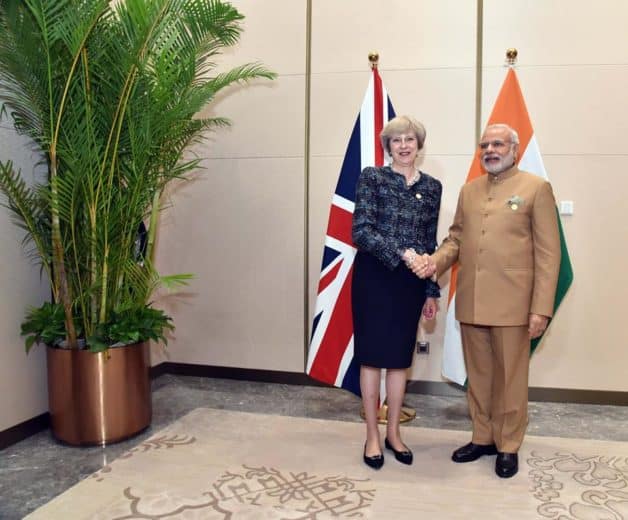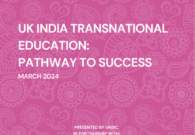The time is now for UK-India relations to flourish
We explore what UK-India bilateral trade and investment relationship will look like following Brexit

The UK and India’s “current trading relationship is strong but, more importantly, there is so much future potential”. These were the words of the UK’s International Trade Secretary, Dr Liam Fox MP, on a visit to India in late August.
The fact that four UK ministers visited India since July 2016 highlights the renewed focus on the importance of this economic relationship. As the UK sets about exploring new bilateral trading partnerships with the rest of the world, it will be starting from a position of relative bilateral strength with India.
The UK is the biggest G20 investor in India over the past 14 years. Some 530 British businesses employ almost 700,000 people in India and have an estimated combined revenue of US$54 billion in India, according to the Sterling Assets India Report by CBI, PwC and the UK India Business Council. At the same time, India is the third largest investor in the UK. Indian companies invest more in the UK than the rest of the EU combined. More than 800 Indian companies currently operate in the UK, employing more than 110,000 people, a Grant Thonrton report has shown.
Additionally, with the increasingly positive momentum in the Indian economy and the opportunities continuing to be offered within the UK, we expect two-way progress in trade and investment to continue. Still, the signing of a comprehensive bilateral economic agreement – comprising a trade agreement covering goods and services and a bilateral trade agreement – should act as a huge catalyst to establish bilateral economic relations on an entirely new footing into the 21st century.
So far so good. However, the reality is that until Brexit plays out and our ongoing relationship with the EU is decided, the UK remains part of the single market and as such is prohibited by treaty to negotiate any form of bilateral agreements – trade treaties and bilateral investment treaties included. Prime Minister Theresa May has promised to evoke Article 50 by March 2017. It is estimated that it will take two years for discussions on Brexit to be concluded before any direct G2G discussions can commence let alone agreement reached. As a result, signing of a bilateral economic agreement with India could be a way in the future.
Is there anything that can be done now? The short answer is ‘yes’. There has already been an announcement from Dr Liam Fox MP and the Indian Minister of Commerce, Nirmala Sitharaman, that they will convene an ongoing dialogue on what the shape of future trade policy should look like. These discussions will be an important building block in establishing common purpose in any economic dialogue.
The current landscape
Until then we must focus on the current realities – the bilateral economic numbers are good, individual line items could be improved. In absolute terms, UK-India bilateral trade grew by 170% between 2004 and 2014. Yet, India’s overall trade grew by 800% in the same period. In relative terms, UK-India trade fell by around 8% in 2014-15. Additionally, India’s goods exports to the UK grew by 226% between 2004 and 2014. The UK’s goods exports to India grew by 153% in the same period.
In 2015-16, the UK was just India’s 12th largest trading partner. India trades more with Indonesia, Germany and Japan, than with the UK. Plus, despite the UK being the second largest exporter of services in the world and India having the second fastest growing services sector with a CAGR of 9%, UK-India services trade is disappointingly low. In 2014, the UK imported over 10 times more services from the US than it did from India, and the UK’s service exports to India makes up just 7% of its total service exports to Asia.
At present, Indian companies can buy from and invest in the UK 10% more cheaply than in June, due to the depreciation in Sterling. Indian businesses will find UK companies are increasingly looking to India for partnerships. And, of course, the UK economy remains fundamentally strong – it is the fifth largest economy in the world, the second fastest market in the G7, and one that, in the words of PM Theresa May, is “bold and outward looking.” Just like India.
For UK companies, India is increasingly open to FDI and it is moving up the ease of doing business rankings. Just as importantly, there is a rising interest demand for UK goods, services, technology, and know-how to help achieve the goals set out in programmes such as Make in India, Digital India, Skill India and Swachh Bharat. And there are several areas where more bilateral trade and investment can bring near term benefits to both countries.
The opportunity is now
Time waits for no-one and it is important that companies don’t wait for the Brexit dust to settle and a comprehensive bilateral economic agreement to be inked to do business – the opportunity is now.
A comprehensive bilateral economic agreement does need not be in place for bilateral economic relations to grow. The UK India Business Council continues to argue there is an important mutually beneficial relationship which can be built between India and the UK based on the development of technology and innovation within the UK to the benefit of Indian industry and economy. The opportunities are multiple for UK and Indian businesses to buy and sell right now. A comprehensive UK-India bilateral economic agreement would help further unlock the relationship’s full potential. Here is selection of examples:
Consumer-focussed products. Domestic, consumer-led, consumption are significant drivers in both the UK and Indian economies. Yet there is little trade in the food, drink, fashion, beauty products and FMCG goods. Although textiles and garments are in India’s top five exports to the UK and spices in their top 10, much more can be done in both directions. Looking into India, UK companies will find a fast-growing, aspirational and value conscious consuming class with an affiliation to British brands.
Make in India. There are several manufacturing sectors that offer substantial scope for UK-India innovation collaborations, however, defence and aerospace are perhaps the most prominent. India has extensive modernisation plans for the defence sector, increasing its FDI in defence to 100 per cent from 26 per cent just two years ago.
Healthcare. India is currently looking to roll out universal healthcare – the UK’s NHS system is a prime example of delivery of this level of care and it would be beneficial for Indian healthcare providers to work with their UK counterparts. At the same time, India’s innovative and top quality healthcare providers have developed processes and systems that could be applied in the NHS.
Will it be easy?
Such a comprehensive bilateral economic deal would be a great prize for both countries, but it won’t come easy. The negotiators will need to navigate some of the same issues that exist in the currently stalled EU-India FTA deal. These include:
- The elimination/ reduction of tariffs for cars, wines and spirits.
- Addressing key non-tariff barriers, such as licensing, customs regulations etc.
- Improved access to the Indian public procurement market.
- Harmonisation of regulations and standards .
- Liberalisation in India of service sectors such as legal, accounts and maritime services.
- Mode 4 – temporary access to the UK for Indian skilled professionals
- The recognition of India as a ‘data secure’ nation.
On top of these specific issues, UK-India negotiations will take place in a world where populist political rhetoric has led to public protest against globalisation and trade-deals. Specifically, the Trans Pacific Partnership Agreement, the Transatlantic Trade and Investment Partnership, and CETA – the Canada-EU deal.
Opportunity for optimism
Nonetheless, with political leadership and will on both sides, there is a good deal to be done that will create jobs and growth in both countries. There is much cause for optimism, for three reasons:
First, a reason the EU-India FTA negotiations have stalled is a lack of engagement at the ministerial level. That has and never will be an issue between the UK and India. The flow of Ministers in both directions is wide – ranging across departments – and constant. Since Prime Minister, Theresa May MP formed her Government, four UK Ministers, three of them from the Cabinet, visited India – Dr Liam Fox, Secretary of State for the new Department for International Trade Minister and separately from his Minister of State Greg Hands, from Secretary of State for DFID, Priti Patel MP and from the FCO Minister for Asia, Alok Sharma MP. Moreover, this does not include the interactions between the two Prime Ministers in the margins of the recent G20 Summit in China. The rapidity and seniority of these discussions illustrates the UK Government’s intent.
The second reason for optimism is that UK and Indian businesses are already tightly entwined, evidenced by the strong investment relationship. Business leaders therefore know the opportunities to be had by a trade deal, and will show the type of leadership and flexibility needed in support of ministers and negotiators.
Thirdly, to help redraw trade relationships with world-leading countries, like India, the UK Government has set up the Department for International Trade, headed by the Rt. Hon Dr Liam Fox MP, and supported by a team of three ministers, including Lord Price, a former businessman, who has responsibility for trade deals. This shows real intent to make things happen.
The long-term wins
The negotiation process will be difficult, and may not be quick. But there is optimism and positivity on both sides that a deal can be agreed. Recognising the complementary nature of our economic strengths and objectives, there is also currently much goodwill in the relationship.
The devil, as ever, will be in the detail. So, when the discussions turn into negotiations, and obstacles emerge, it will be important that political and business figures retain the positivity and goodwill. They must also show the leadership needed to reach a deal that enables the potential in the UK-India relationship that Dr Fox so rightly highlighted to be realised.







